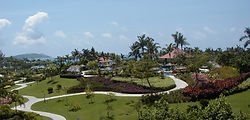Abia State was carved out of the former Imo State in 1991. The name "Abia" is an abbreviation of four of the state's densely populated regions Aba, Bende, Isuikwuato, and Afikpo. Abia is in southeastern Nigeria. The capital is Umuahia and the major commercial city is Aba. Abia has an estimated population of 2.8 million.
The Government
Theodore Ahamefule Orji was elected Governor of Abia State on May 29, 2007. He was re-elected
in 26 April 2011 as Governor.
17 LOCAL GOVERNMENT AREAS
Aba North
Aba South
Arochukwu
Bende
Ikwuano
Isiala Ngwa North
Isiala Ngwa South
Isuikwuato
Obi Ngwa
Ohafia
Osisioma Ngwa
Ugwunagbo
Ukwa East
Ukwa West
Umuahia North
Umuahia South
Umu Nneochi
The People
Abia people are of the Igbo ethnic group who predominates much of the Southeastern part of Nigeria. Their traditional language is Igbo. English is widely spoken and serves as the official language in governance and business.
Commerce & Agriculture
Abia State is also home to Aba, a major commercial city which has the highest population in Abia State Aba is also well known for the Ariara market, which is reputed to be one of the largest markets in West Africa. The people of Abia State are reputed to be entrepreneurial, industrious and market trading oriented.
The main industry in Abia State is farming and agricultural produce includes oil palm, Cashew, rubber, cocoa, coconut and cassava.
Tourist attractions in Abia State include:
Azumiri Blue River, Ukwa East
Long Juju (Ibina Ukpabi), Arochukwu
Museum of Colonial History, Aba
National War Museum, Umuahia
Ngodo and Uhuchukwu caves, Umunneochi
Obu Nkwa, Asaga Ohafia
Ojukwu Bunker, Umuahia




